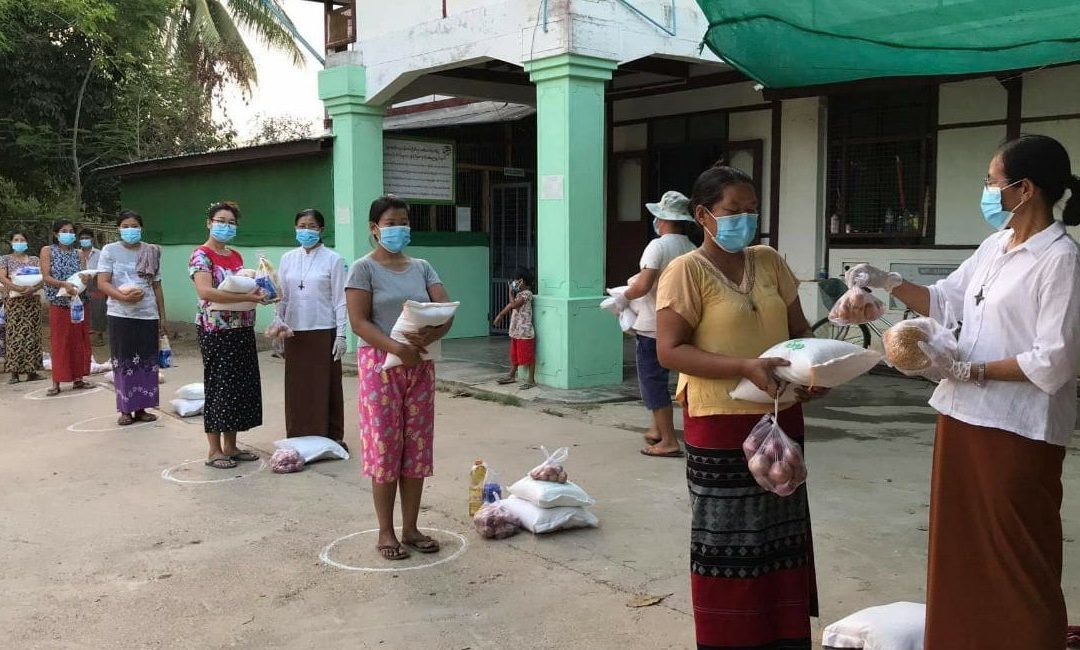This article is part of Reality of Aid – Asia Pacific’s COVID-19 Response Series, “Resisting Repression; Recovering Together”, which aims to document the struggles, best practices, and lessons learned, as well as share recommendations of RoA-AP members as they responded to the pandemic at the national or regional level. Read more stories here.
By Nyi Nyi Aung, Local Resource Centre (LRC)
Just as it began planning to restore its normal state of affairs, Myanmar was unexpectedly hit by another wave of Covid-19 cases in August 2020. Local transmission first emerged in Rakhine, and quadrupled nationwide by mid-month. Unfortunately, even with overworked medical staff, extended testing, and a stringent quarantine policy, the country’s weak healthcare system could no longer manage the growing caseload. To cope with the second wave, then, the Burmese government introduced a nationwide volunteer system by late 2020. This triggered a surge in CSO engagement for the country’s response and recovery activities, mainly through technical and financial support, food distribution, information dissemination, and manpower for quarantine and migrant reception centers.
CSOs at the frontlines
In October and November 2020, Burmese NGO Local Resource Centre (LRC) conducted an online assessment to gauge and monitor the nature of CSO involvement. The survey was conducted through Google Forms, and received a total of 425 respondents. LRC reported that most of them—specifically 387 —participated in Covid-19 prevention and response activities throughout the country. 60% mentioned that they were from CSOs or community-based organizations (CBOs), mainly within the health and protection sectors. Interestingly, the water, sanitation, and hygiene sector was the least represented in local efforts to combat the virus.
LRC’s findings also revealed that CSOs and CBOs were the largest sources of Covid-19 information for local communities, which were followed by township health teams and volunteers. This is attributed to the fact that the majority of organizations—82% in particular—engaged in health education to contribute to the national pandemic response. A large number of respondents (77%) was also involved in the distribution of Covid-19 protective equipment. These actually reflect the support received by the civil society groups, which primarily took the form of protective materials along with information, education, and communication (IEC) materials on the virus.
Acting alone
It goes without saying, however, that CSOs have encountered several difficulties in effectively implementing their initiatives. Movement restrictions due to lockdown measures, for example, have decreased productivity and impeded “timely achievement of response activities,” according to one respondent. LRC noted that this is aggravated by inadequate collaboration with the government, who sometimes discourage civil society participation in their action plans. Without their backing, CSOs also struggle to gain the cooperation of community members; one respondent commented that “Some communities did not trust us and they did not want to collaborate with us for Covid-19 prevention.” In fact, other groups fail to reach them altogether. Local authorities tend to grant travel permits late or reject requests completely, making remote communities like internally displaced persons even more unreachable.
The survey results also highlighted that the majority of organizations have been receiving limited technical and financial support, along with insufficient Covid-19 prevention materials. One respondent also remarked that “There are a few remaining challenges, but funding is a major challenge.” This is likely because nearly half (49%) of the respondents’ initiatives are self-funded, while only 40% at most have a supplementary source of funding, like grants from local NGOs or the private sector.
For playing such an important role, it is surprising how CSOs barely get the support they need from the rest of the country. Myanmar’s government in particular must begin to recognize the contributions of civil society to bolster its volunteer system and effectuate stronger strategies as a whole. After all, “the Covid-19 pandemic highlighted the importance of the engagement and commitment of local actors in responding to any kind of emergency, disaster, and conflict,” LRC says. Therefore, a collective and multi-sectoral response that employs the simultaneous efforts of CSOs, local authorities, and the government is essential to winning the battle against Covid-19.
Photo source:

